Politics
/ArcaMax
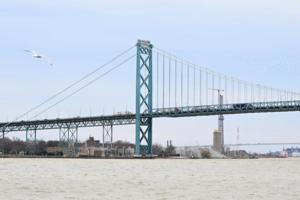
Moroun donates $1 million to MAGA fund days before Trump's bridge threat
DETROIT — Matthew Moroun, whose family owns the Ambassador Bridge, gave $1 million to a political action committee that supports Republican President Donald Trump less than a month before Trump threatened to block the opening of a new, competing span between Detroit and Canada.
The $1 million receipt for the super PAC MAGA Inc. was revealed ...Read more
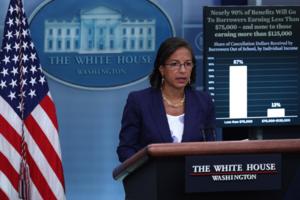
Trump threatens Netflix with 'consequences' over Susan Rice board seat
Donald Trump called on Netflix to fire board member Susan Rice or “pay the consequences,” after she said that Democrats would take action against corporations that “take a knee” to the president.
Rice, who was former President Barack Obama’s national security adviser and United Nations ambassador and also served in Joe Biden’s White...Read more
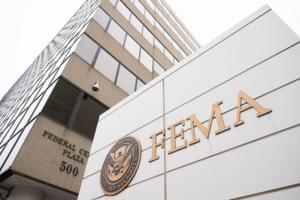
Trump approves FEMA role in repair of collapsed DC sewer pipe
WASHINGTON — The Federal Emergency Management Agency said it’s helping the District of Columbia clean up and make repairs after a section of sewer line collapsed last month, leading to a massive discharge of raw sewage into the Potomac River.
Washington, D.C., Mayor Muriel Bowser declared a public emergency over the collapse on Wednesday ...Read more
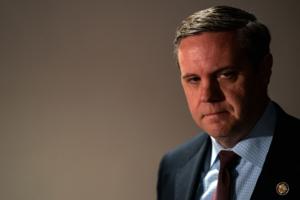
Trump pulls endorsement of Colorado Republican over tariff votes
WASHINGTON — President Donald Trump withdrew his endorsement of US Rep. Jeff Hurd for reelection after the Colorado Republican voted against the president’s tariffs.
“Congressman Hurd is one of a small number of Legislators who have let me and our Country down. He is more interested in protecting Foreign Countries that have been ripping ...Read more
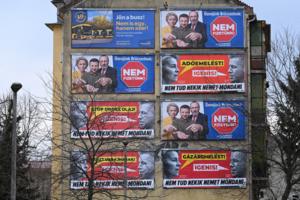
Desperate for reelection, Hungary's Orban latches on to war fears
Three years past retirement age, Imre still works every day. Soaring inflation in Hungary has made a pittance of his 120,000 forint-a-month ($370) pension.
But on April 12 the former bookseller will vote to reelect Viktor Orban anyway. He fears the opposition will send his son to the front in Ukraine.
“And because the Ukrainians hate ...Read more
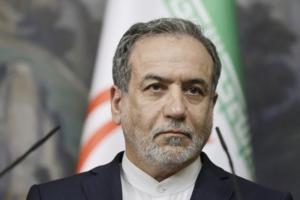
US accepted Iran's bid to maintain uranium enrichment, ISNA says
U.S. officials have accepted Iran’s red line of continuing to enrich uranium, the semi-official Iranian Students’ News Agency quoted one of the country’s diplomats as saying.
The idea that Iran would completely stop nuclear enrichment was dismissed during the recent U.S. talks in Geneva, according to the diplomat, whom ISNA did not ...Read more
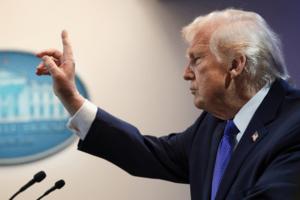
Trump's treasured negotiating edge dulled by tariff defeat
With the stroke of a pen, the Supreme Court wreaked havoc on President Donald Trump’s favorite method of wielding leverage over other countries.
The justices’ landmark ruling Friday striking down the administration’s global tariffs marks a significant blow to a president who relishes exerting unilateral power to achieve his goals — ...Read more
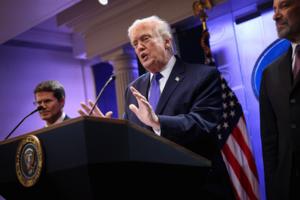
Trump boosts new tariff rate to 15% a day after announcing 10%
President Donald Trump said he will increase the global 10% tariff he announced one day earlier to 15%, stirring up more economic turbulence as he lashed out at the U.S. Supreme Court over its ruling that his preferred mechanism for applying tariffs was illegal.
“I, as President of the United States of America, will be, effective immediately,...Read more
Desperate for reelection, Hungary's Orban latches on to war fears
Three years past retirement age, Imre still works every day. Soaring inflation in Hungary has made a pittance of his 120,000 forint-a-month ($370) pension.
But on April 12 the former bookseller will vote to reelect Viktor Orban anyway. He fears the opposition will send his son to the front in Ukraine.
“And because the Ukrainians hate ...Read more
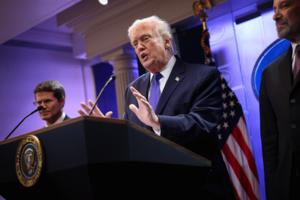
Trump says he will increase global tariffs to 15% from 10%
President Donald Trump said he will increase the global 10% tariff he announced one day ago to 15% as he lashed out at the U.S. Supreme Court over its ruling that his mechanism for applying tariffs was illegal.
“I, as President of the United States of America, will be, effective immediately, raising the 10% Worldwide Tariff on Countries, many...Read more
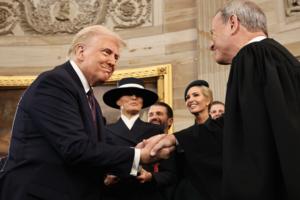
Supreme Court draws a line with Trump by curbing tariff powers
President Donald Trump finally pushed the U.S. Supreme Court too far.
With its rejection Friday of Trump’s claim of unbridled power to impose and remove tariffs, the court reasserted itself as a constitutional guardrail and laid out fresh limits on presidential authority. The decision follows a year in which the conservative-dominated court ...Read more
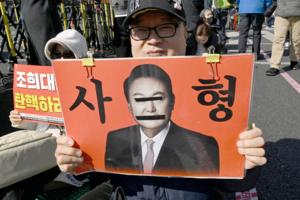
Editorial: Accountability matters: Andrew and South Korea president face justice, but not Trump
How come high-ranking and important people elsewhere, such as Britain and Korea, can be held accountable for their actions, but not the highest-ranking and most important person in this country?
The man who was once called Prince Andrew has now been arrested in the U.K. in connection to his apparent sharing of privileged information with ...Read more
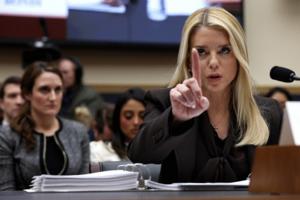
Editorial: AG Pam Bondi's performance proves she's unfit for the job
It’s one thing to embarrass yourself before a national audience, but when you embarrass the entire United States with your nonsensical responses to questions from members of Congress, it’s time for a major change.
That’s what U.S. Attorney General Pam Bondi did when she recently testified before the House Judiciary Committee concerning ...Read more
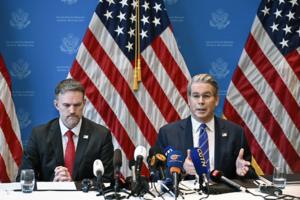
Mexico, Canada get exemption to 10% US levy but USMCA risk looms
The U.S. Supreme Court’s decision to strike down many of Donald Trump’s tariffs offers some relief to Mexico and Canada, but a much bigger set of risks still hangs over the trade relationship that joins the three countries.
The president said in the afternoon the U.S. would impose a 10% levy on foreign goods under a different law. It took ...Read more
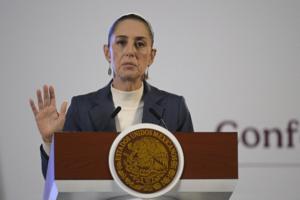
Supreme Court ruling against Trump's tariffs leaves Mexico in cautious wait-and-see mode
Mexico's secretary of the economy, Marcelo Ebrard, urged "prudence" Friday in the aftermath of the U.S. Supreme Court ruling invalidating part of President Donald Trump's sweeping tariff regimen.
"We have to see where this is going," Ebrard told reporters. "We have to see what measures (Washington) is going to take to figure out how it is going...Read more
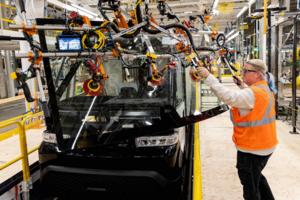
Detroit auto industry spared from Trump's latest tariff program
Detroit’s automakers learned Friday night that they had been spared from tariffs that President Donald Trump imposed after the U.S. Supreme Court struck down most of his global duties.
Trump on Friday night put in place a flat 10% levy on foreign goods that is to take effect on Tuesday. But in a fact sheet, the White House affirmed that ...Read more
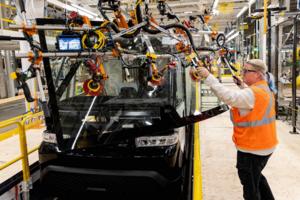
Detroit automakers ask White House to be spared from new tariffs
Detroit’s automakers asked the White House to shield them from new tariffs that President Donald Trump vowed to impose after the Supreme Court struck down most of his global duties.
The American Automotive Policy Council, which represents General Motors Co., Ford Motor Co. and Jeep-maker Stellantis NV, sent a letter to Trump’s trade team ...Read more
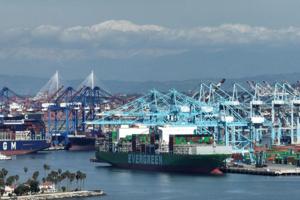
What the Supreme Court's decision to strike down tariffs means for LA's trade-dependent economy
LOS ANGELES — The Supreme Court's decision Friday to strike down the majority of tariffs imposed by President Donald Trump could provide some relief to L.A.'s trade-reliant economy — but only if they are not reimposed again through other means.
The court's 6-3 ruling that Trump didn't have the authority to impose tariffs under the ...Read more
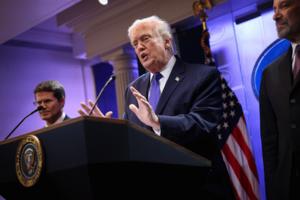
Supreme Court tariff ruling puts federal revenue forecast on shaky ground
WASHINGTON — The Supreme Court’s ruling against President Donald Trump’s worldwide tariffs threw a monkey wrench into budget projections that assumed a hefty spike in tariff revenue to help reduce federal deficits. But at least in the short term, a replacement tariff regime may keep that bucket from leaking too much.
The high court on ...Read more
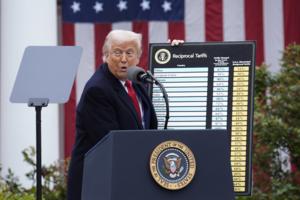
Supreme Court invalidates Trump's tariff regime
WASHINGTON — The Supreme Court invalidated much of the Trump administration’s worldwide tariff regime in a ruling released Friday, dealing a major setback to one of President Donald Trump’s signature domestic and foreign policy efforts.
The 6-3 ruling found that Trump overstepped the emergency authority Congress gave to presidents in the ...Read more
Popular Stories
- Trump says he will increase global tariffs to 15% from 10%
- Savannah Chrisley gets shut down on 'The View' for insisting Trump isn't racist
- Desperate for reelection, Hungary's Orban latches on to war fears
- Trump calls justices 'fools,' announces new 10% global tariff after Supreme Court setback
- US accepted Iran's bid to maintain uranium enrichment, ISNA says




















































